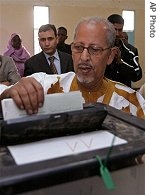2007年VOA标准英语-Mauritania Election Heads to Runoff(在线收听)
Dakar
12 March 2007
In Mauritania, results from Sunday's presidential election indicate a second round of voting will be necessary. The top two vote getters are a former government minister and an opposition leader. International observers say the voting process has been transparent and fair in the nation's first post-coup presidential poll. Kari Barber reports from our West Africa bureau in Dakar.
 |
| Mauritanian presidential candidate Sidi Ould Cheikh Abdallahi casts his vote in Nouakchott, 11 March 2007 |
A candidate needs at least 50 percent of the vote to win office and avoid a second round.
Campaign observers say the process has been free and fair. But there was one confirmed incident of violence as unidentified, armed men killed a guard at a vote counting site overnight and shot at an EU vehicle. The men escaped. It is unclear whether they intended to attack the voting station or EU workers.
Local analyst Racine Sy says there were concerns early in the campaign that the military leadership, which overthrew long-time president Maaouiya Old Taya in 2005, was backing Sheik Abdellahi. But Sy says he is happy with how the election has been managed.
"When they came to power they had a lot of promises, but and the end we had certain fears because of declarations we heard from the head of state," he said. "It turned out to be very good; it turned out to be a democratic election."
Campaign observer Fatimata Mbaye says she is watching closely to make sure the military junta keeps their promise to stay out of the election process. She says that if a second round does not take place, it could be a sign the military is meddling.
"We think we will have a second round for this election, and if we do not have a second round, that means something is wrong and the people will react," she said.
Mbaye says she is pleased with the process and optimistic about the country's future as a democracy.
"Now we are tasting our democracy and we hope we will get it the right way," she said. "It is really our hope, and we think that we can do something and we can get someone who can really govern this country."
Mauritania recently became an oil-producing nation. The spending of that new windfall of revenue has been a top issue in the election.
The presidential poll represents the final step of a transition from military to civilian rule in the nation. A successful democratic hand over of power has never occurred in Mauritania.
If a second round of voting takes place, it will be the first time in Mauritanian history a leader did not win outright in the first round.